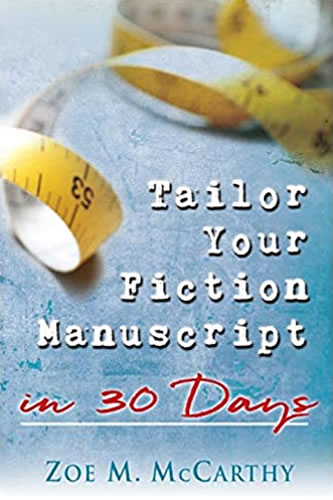

I finished reading Tailor Your Fiction Manuscript in 30 Days. I have AND will highly recommend it to anyone who dabbles in fiction. It’s one of the best “how to” books I’ve ever read.—Marsha Hubler, Director Montrose Christian Writers Conference
Find more information at the end of this post.
During the years I’ve been writing, I’ve worn an imaginary backpack full of the many tips I’ve received from writers and editors. While I’m writing or publishing, these tips jump out of my backpack onto my shoulders and whisper their wisdom in my ears. Some may sound contradictory, but their truths arise in different situations. I have featured many of these tips in my blog posts over the years. Here’s a list of my favorites.
General

2. Usually, you need to write four completed manuscripts to learn to write. The fifth manuscript usually earns a contract. (from agent Chip MacGregor)
3. If you self-publish, hire a professional editor.
4. If a contest judge, critique partner, or editor has an issue with a sentence or paragraph that surprises you, don’t let it ruffle your feathers. The issue stopped that person from reading your story. See if there’s a way you can make a change that would keep the person reading.
5. Join a critique group whose members can tell you the truth in a way that you can receive it.
6. Attend virtual or in-person writers conferences.
The Story

7. Your first sentence should grab your reader in a way the reader must continue to read your story.
8. Ground the reader at the beginning of every scene: the who, where, and when.
9. Don’t give tedious setting descriptions; show the setting through the characters’ actions.
10. Keep the action linear in a scene so the reader is with the character minute by minute.
11. In the beginning scene(s), give the reader a glimpse of the protagonist’s ordinary world, which will contrast with the new journey the protagonist will begin.
12. An incident must happen that sends the protagonist out of his or her ordinary world onto a journey.
13. Every scene must have a purpose, and at least one should add conflict, advance a goal, or change a character’s motivation.
14. A story doesn’t need to have a happy ending, but it needs to have a satisfying ending.
15. Every story should have a twist.
Characters
16. Readers expect protagonists’ flaws, but they want to root for the protagonist, so beneath the protagonist’s surliness he or she must have inherent goodness.
17. The protagonist should have inner and outer goals and a greatest fear. These should impact the protagonists journey.
18. The reader should be able to distinguish characters by the way they speak, but an action beat (John grabbed his water bottle. “I want you to …”) or speaker attribute (John said) are often necessary to make sure the reader knows who’s talking.
The Writing

19. Beware of using weasel words, e.g., that, just, very, rather, some, immediately, suddenly, sure, and really.
20. Backload your paragraphs with a word that supports the meaning of the paragraph, instead of dull words, such as her, him, could, was.
21. Choose strong verbs and nouns. Keep a thesaurus handy.
22. Chose the right word. Keep a dictionary handy.
23. Show don’t tell.
24. Fix sentences that have impossible simultaneous actions: Reaching behind her for her scarf, she wrapped it around her neck. (How can she tie a scarf around her neck while she’s reaching behind her for said scarf?)
25. Kill your darlings. Just because you love the sentence, paragraph, or scene, doesn’t mean it’s right for your story.
What tips for becoming a writer would you add to my backpack?

Zoe McCarthy’s book, Tailor Your Fiction Manuscript in 30 Days, is a fresh and innovative refocusing of your novel or novella. Through a few simple—and fun—steps, Zoe helps writers take their not-ready-for-publication and/or rejected manuscripts to a spit-polish finish. Writing is hard work, yes, but it doesn’t have to be difficult.—Eva Marie Everson, best-selling and award-winning author, conference director, president of Word Weavers International, Inc.



 RSS - Posts
RSS - Posts



Great stuff. Especially 4. If a contest judge, critique partner, or editor has an issue with a sentence or paragraph that surprises you, don’t let it ruffle your feathers. The issue stopped that person from reading your story. See if there’s a way you can make a change that would keep the person reading.
Marcia, that’s the one tip that I learned from entering contests and joining critique groups!
Great tips. Doing them is the next trick!
Yes, Sally Jo, remembering them and doing them is a challenge.